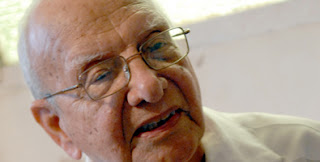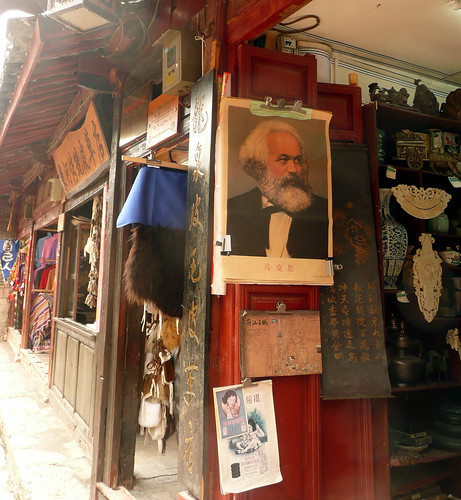Ivory Coast: Behind the post-election political crisis and threat of military intervention
Ivorians protest against food price increases in 2008.
By Peluola Adewale
Jannuary 5, 2011 -- Democratic Socialist Movement (Nigeria) -- That the November 28, 2010, run-off election in the Ivory Coast has produced two presidents – Alassane Ouattara and Laurent Gbagbo – is not a surprise, though working people had expected the election to usher a return of peace. The country has been divided into two since the 2002 coup attempt and subsequent rebellion, with each half effectively having its own de facto government. The north is controlled by rebels, Forces Nouvelles (New Forces), while the south is under Gbagbo with the support of the armed forces and youth militia. Therefore, on this account and with the ethnocentric sentiment that has characterised Ivorian politics in the last two decades, it is natural that the results of the election from either half would be bitterly disputed by the party declared the loser of the contest.
Socialist Party USA: `No to political assassinations! Let’s make a democratic revolution!'

By Andrea Pason & Billy Wharton, co-chairs Socialist Party USA
Capitalism and degrowth: An impossibility theorem

By John Bellamy Foster
January 2011 -- Monthly Review -- In the opening paragraph to his 2009 book, Storms of My Grandchildren, James Hansen, the world’s foremost scientific authority on global warming, declared: “Planet Earth, creation, the world in which civilization developed, the world with climate patterns that we know and stable shorelines, is in imminent peril…The startling conclusion is that continued exploitation of all fossil fuels on Earth threatens not only the other millions of species on the planet but also the survival of humanity itself—and the timetable is shorter than we thought.”1
US imperialist aggression in the early 21st century
Washington has reactivated the US Navy’s 4th Fleet to ensure US power projection over the Caribbean, Central and South America.
[This talk was presented at the regional “socialism conference” was held in Manila from November 27 to 28, 2010. The conference was organised by the socialist Partido Lakas ng Masa (Party of the Labouring Masses) and the socialist-feminist regional network Transform Asia.]
By Rasti Delizo
How the Communist Party of Australia exposes the Democratic Socialist Party's 'Trotskyism'
By Doug Lorimer
[This article first appeared in the Democratic Socialist Party's internal discussion bulletin, The Activist, volume 10, number 7, August 2000.]
The Communist Party of Australia has recently published a pamphlet by David Matters entitled Putting Lenin's Clothes on Trotskyism which claims that the DSP's rejection of Trotsky's theory of permanent revolution is really a cover for its support for Trotskyism. However, the real purpose of the pamphlet is to criticise the DSP's position on the 1998 waterfront dispute.
This is made clear in the introduction to Matters' pamphlet by CPA general secretary Peter Symon:
In writing Putting Lenin's clothes on Trotskyism, David Matters has contributed to the task of clarifying ideas and maintaining the validity and truth of Marxism...
The attack on Marxism in the name of Marx, or on Lenin in the name of Lenin, is a particularly pernicious form which can easily mislead those who are not familiar with what Marx, Engels and Lenin actually said and wrote.
The pretension that Trotsky was a great Leninist is one of these misrepresentations and was refuted time and again by Lenin.
Cuba: Economy of commands or earnings? Joaquin Infante on economic changes

Portugal: More austerity looms in 2011

General strike against austerity in Portugal, November 24, 2010.
By Raphie de Santos
January 4, 2011 -- Socialist Resistance -- A full financial bailout of Portugal involving the European Central Bank (ECB) and the International Monetary Fund (IMF) looks set to happen in the first half of 2011. This will involve severe austerity conditions being imposed on the Portuguese people by the ECB and IMF.
The indications are clearly there as at the end of 2010 Fitch joined the two other credit rating agencies to downgrade Portugal’s debt to A+, which is just above junk status. They are concerned that the current account deficit running at 9% is unsustainable with the ruling Socialist Party unable to impose the effective 4% budget cuts in 2011 that they outlined at the end of 2010.
China: An international dialogue on Marx

A trader in Lijang, China, selling images of Karl Marx. Photo by Malias.
By Norman Levine
January 4, 2010 -- Links International Journal of Socialist Renewal -- Organised by Marcello Musto of York University (Toronto, Canada), an international delegation of scholars from Canada (Marcello Musto and George Comninel), USA (Norman Levine), England (Terrell Carver), Japan (Hiroshi Uchida and Kenji Mori) and South Korea (Seongjin Jeong) participated in a two-week series of colloquiums and lectures in China. This delegation was invited and graciously hosted by Fudan University of Shanghai and Nanjing University (two of the top five universities in China), and by the Chinese Academy of Social Sciences (CASS) and the Chinese Central Compilation and Translation Bureau (CCTB) of Beijing. The faculties and administration of each of these institutions partnered in these colloquiums, which also saw the participation of Chinese academics from 23 different universities (and, among them, of many deans and chairs of departments).
Marx-Engels Gesamtausgabe (MEGA2): Has another Marx been revealed?

France, 2010: 'Karl Marx is not dead.'
Why does health care in Cuba cost 96% less than in the US?

Claudia Lopez, an intern, with outpatients at 5 de Septiembre Polyclinic, Havana. Photo by Gail Reed/World Health Organisation.
Irish crisis: A complete failure for neoliberalism

By Eric Toussaint, translated by Christine Pagnoulle in collaboration with Judith Harris
January 3, 2011 -- CADTM -- For a decade, Ireland was heralded by the most ardent partisans of neoliberal capitalism as a model to be imitated. The "Celtic Tiger" had a higher growth rate than the European average. Tax rates on companies had been reduced to 12.5% |1| and the rate actually paid by the transnational corporations that had set up business there was between 3 and 4% -- a CEO’s dream!
